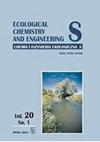利用地理信息系统和高分辨率卫星图像绘制内陆过剩水资源:以塞尔维亚SREM为例
IF 2.5
4区 环境科学与生态学
Q3 ENVIRONMENTAL SCIENCES
Ecological Chemistry and Engineering S-Chemia I Inzynieria Ekologiczna S
Pub Date : 2023-09-01
DOI:10.2478/eces-2023-0037
引用次数: 0
摘要
受气候变化的影响,洪水、干旱等极端水文事件越来越频繁,对经济各领域产生了负面影响。潘诺尼亚-喀尔巴阡盆地尤其受到日益频繁的危险水文事件的影响。农业生产是该地区非常重要的经济部门,特别容易受到这些不利气候条件的影响。降水模式和土壤湿度水平的变化可能导致作物减产,而洪水可能污染水源并侵蚀肥沃的土壤。内陆过量水(也称为积水或涝渍区)的测绘对于知情决策、损害赔偿、风险管理和未来预防规划至关重要。遥感技术和机器学习已被证明是绘制电子战图的宝贵工具。2014年欧洲东南部和中部的洪水提醒我们有效的洪水风险管理的重要性。本研究使用地理信息系统(GIS)和半自动分类处理(SCP)工具处理2014年塞尔维亚Srem地区洪水的高分辨率RapidEye卫星图像。利用光谱角映射(SAM)分类模型,生成了一幅IEW地图。SAM模型的总体准确率为92.68%。研究发现,在斯雷姆,电磁波影响了约2.90%或99.59平方公里的领土。获得的地图可供负责任的水管理机构使用,以防止和控制过量的内陆水。本文章由计算机程序翻译,如有差异,请以英文原文为准。
Mapping of Inland Excess Water Using Geographical Information System and High-Resolution Satellite Images: A Case Study of SREM, Serbia
Abstract Extreme hydrological events, such as floods and droughts, are becoming more frequent as a result of climate change, leading to negative impacts on various economic sectors. The Pannonian-Carpathian Basin is particularly affected by the increasing frequency of hazardous hydrological events. Agricultural production, which is a highly significant economic sector in the region, is particularly vulnerable to these unfavourable climatic conditions. Changes in precipitation patterns and soil moisture levels can lead to reduced crop yields, while floods can pollute water sources and erode fertile soil. Mapping of Inland Excess Water (IEW), also known as ponding water or waterlogged areas, is crucial for informed decision-making, damage compensation, risk management, and future prevention planning. Remote sensing technology and machine learning have been demonstrated to be valuable tools for the mapping of IEW. The 2014 floods in Southeastern and Central Europe serve as a reminder of the importance of effective flood risk management. This study used a Geographical Information System (GIS) and a Semi-automated Classification Processing (SCP) tool to process high-resolution RapidEye satellite images from the 2014 floods in the Srem region of Serbia. The Spectral Angle Mapping (SAM) classification model was used to produce a map of IEW. The SAM model achieved an overall accuracy of 92.68 %. The study found that IEW affected approximately 2.90 % or 99.59 km² of the territory in Srem. The obtained maps can be used by responsible water management agencies to prevent and control excessive inland water.
求助全文
通过发布文献求助,成功后即可免费获取论文全文。
去求助
来源期刊
CiteScore
2.80
自引率
36.80%
发文量
32
审稿时长
>12 weeks
期刊介绍:
The quarterly Ecological Chemistry and Engineering S is a multidisciplinary journal devoted to the publishing of original scientific papers, review articles, professional papers, case reports and varia (professional information, book reviews, etc.).
It is pertinent to describe methods determining quality of air, water, soils and food.
Many papers published are on monitoring and biomonitoring of an environment and on transfer of pollutants (eg heavy metals or radionuclides) from soil to plants. Some Authors consider impact of environment pollution on food and human health.
Some papers describe models of pollutant spreading in air or within soil. Others are devoted to various technologies to prevent or minimize industrial pollution, as well as to remediation techniques.
Papers on renewable energy sources are also very welcome.

 求助内容:
求助内容: 应助结果提醒方式:
应助结果提醒方式:


